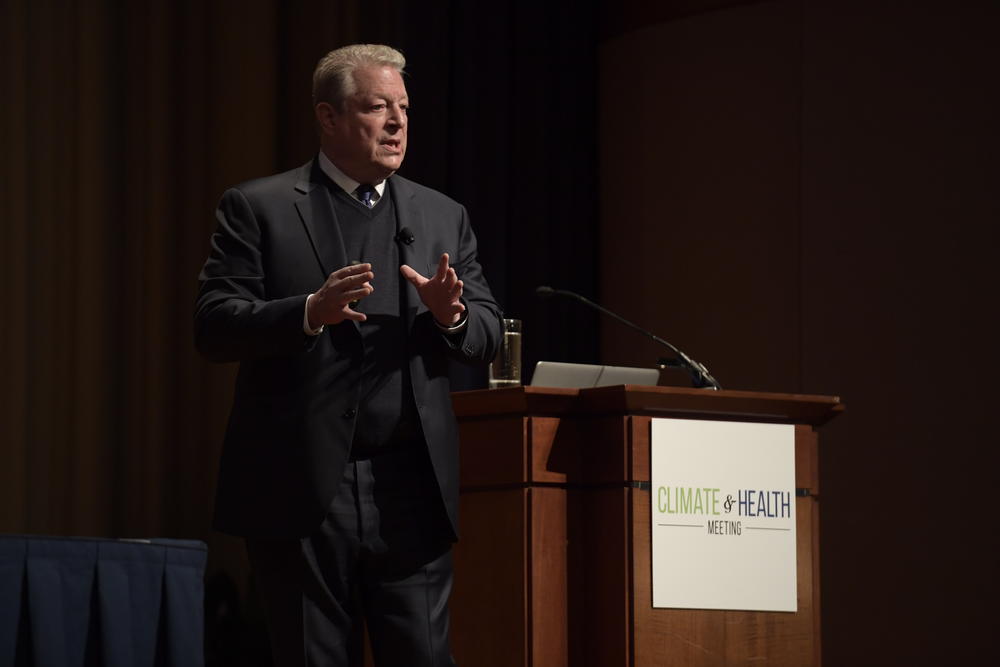Section Branding
Header Content
Climate Change And Public Health Converge At Al Gore's Conference
Primary Content
Several hundred climate scientists and public health professionals descended on the Carter Center in Atlanta today. It was for a climate and health conference organized by former Vice President Al Gore.
A similar conference at the CDC was postponed in late December.
Throughout the day, several panelists and keynote speakers addressed some of the effects climate change can have on people's health.
Georges Benjamin, @PublicHealth: "Addressing climate change is clearly an issue of social justice." #climatechangeshealth— Stephen Fowler (@stphnfwlr) February 16, 2017
This conference was originally meant to be a three-day affair put on by the CDC’s Climate and Health division.
Shortly before the end of 2016, speakers and attendees were quietly notified of the indefinite postponement of the conference.
The official word was that they were exploring other options or areas where the conference overlapped with other conferences.
Some of the original speakers and co-organizers say there was uncertainty around the Trump administration taking office.
Since the election, the campaign has said climate change is not high on its laundry list of important issues.
Former President Carter is here at #climatechangeshealth pic.twitter.com/APZzS2tfq0— Stephen Fowler (@stphnfwlr) February 16, 2017
Former President Jimmy Carter stopped by the conference in the afternoon to share his thoughts on the matter:
“The CDC has to be politically cautious. The Carter Center does not. I have secret service protection for the rest of my life and I’m not running for any office, so I’m kind of immune to politics.”
Al Gore runs the Climate Reality Project, which is a group that aims to curb carbon emissions and other harmful pollutants to help the environment.
He was supposed to be a keynote speaker at the original conference, and when it was postponed, he called President Carter and Atlanta’s own Turner Foundation to organize their own conference.
Gore said that while his work is focused more on climate, the conference was firmly grounded in the study of public health.
“With all the work that’s been done on the climate crisis and the solutions to the climate crisis, many would argue too little attention has been paid to the health consequences of the climate crisis. And we hope to help remedy that today.”
Beyond the event taking place in Atlanta, the city had a prominent role in some of the conversations.
On ATL's climate commitment, @StuckeyStop quotes @KasimReed: "Cities are where hope meets the streets." #climatechangeshealth— Stephen Fowler (@stphnfwlr) February 16, 2017
Stephanie Stuckey is the City of Atlanta’s Chief Resiliency Officer. It's a new role aimed at prepping the city for everything from tornadoes to logistics of recycling.
She spoke to the conference about Atlanta’s role in taking a public health approach to climate problems.
One example of is an announcement that came just yesterday.
Stuckey says the city will be investing millions of dollars in the Proctor Creek Watershed that covers the west side of Atlanta, from Bankhead to Vine City and English Avenue.
“We’ll be partnering with the Corps of Engineers and other federal agencies to do an ecological habitat restoration study of the Proctor Creek Watershed.
We’re seeing with increased incidences of flooding and drought that the impact on our watersheds are acute.
Proctor Creek is the only watershed that’s located entirely within the city limits, so it’s uniquely Atlanta’s watershed.”
Atlanta’s also part of an initiative called 100 Resilient Cities, which is a Rockefeller Foundation initiative that helps cities around the world tackle issues beyond natural disasters.
Think things like urban sprawl, high unemployment numbers, or climate change.
Speakers throughout the day – and from around the world, kept hammering home the idea that solutions to issues surrounding climate and health are available.
A roadblock is the lack of resources available to study and implement these solutions.
Talk is cheap, but changing the nation’s action and mindset is not.
One of the organizers of the event is Ashish Jha with the Harvard Global Health Institute.
"Walls will not keep pathogens out." -@ashishkjha #climatechangeshealth— Stephen Fowler (@stphnfwlr) February 16, 2017
He says a lot of tangible effects can come from universities around the country.
“Universities have a special contract with the American people. And the contract goes something like this: We commit to working on the most pressing issues facing our citizens and facing the world, and the American people, through their government, commits to supporting that work.”
For now, President Carter and Vice President Gore say they both remain committed to continuing these conversations – with or without the federal government – until the cows come home.
The American Public Health Association has declared 2017 the year of Climate and Health and is having its own conference in the fall.


